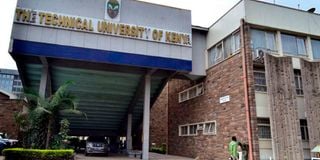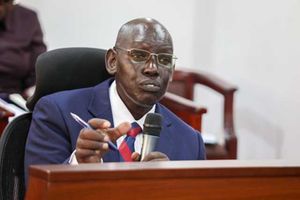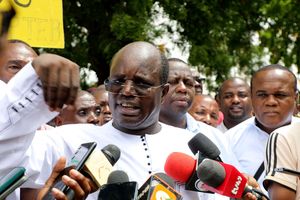
The Technical University of Kenya campus along along Haile Selassie Avenue in Nairobi.
The Kenya Polytechnic was the first national polytechnic in the country. In its glory days, it was the go-to middle-level institution for acquisition of technical skills that were highly valued by employers.
The polytechnic graduates favourably competed in the job market with university graduates and at times, outdid the degree holders. However, since it was converted into a university, the institute has faced challenges that now threaten its survival.
Its conversion to the Technical University of Kenya (TUK) followed recommendations of the 2005 Sessional Paper No. 1: A Policy Framework for Education, Training, and Research.

Technical University of Kenya staff participate in a demonstration at the institution in Nairobi on February 17,2025.
The strike by lecturers at TUK that forced its indefinite closure on February 3 was long in coming. Education Cabinet Secretary Julius Ogamba has set up a 26-member working committee to explore ways of reopening the university.
Lecturers and other workers at TUK have accumulated salary arrears for three months. They received only 70 per cent of their November 2024 salaries a few days to Christmas Day and have not been paid since. Before the university was closed, lectures used to attend classes erratically.
“I sympathise with the students as they haven’t been taught properly. The semester has also taken too long and the majority of the students have rented accommodation,” a source said.
When lecturers refused to administer examinations, some senior management staff attempted to oversee the exercise but were flashed out by the striking lecturers and some students, leading to closure of the university.
TUK staff, through the Universities Academic Staff Union (Uasu) as well as the Kenya Universities Staff Union (Kusu) have salary delays, poor working conditions, and implementation of collective bargaining agreements (CBA) as their top grievances.

Universities Academic Staff Union Secretary General Constantine Wesonga (center) with lecturers of Technical University of Kenya on September 18, 2024 during the first day of the university lecturer’s nationwide strike.
A petition submitted by the unions to the National Assembly and the Ministry of Education cites failure by the university to pay enhanced January 2025 salaries under the 2021–2015 CBA. They complained that repeated salary delays make it difficult for them to meet their financial obligations and demanded the immediate remittance of statutory and third-party deductions.
As of June 30, 2024, the university had not remitted Sh6.079 billion deducted from staff salaries as Pay-As-You-Earn while National Social Security Fund contributions were pending for eight months. Additionally, bank loan repayments amounting to Sh188.41 million, Sacco contributions totalling Sh26.58 million, and union dues for 28 months remained unpaid. Unpaid third-party claims stood at Sh974.31 million.
Another point of contention is the loss of pension funds, with the TU-K Staff Retirement Benefits Scheme collapsing, and the subsequent disappearance of Sh5.467 billion in employees’ retirement savings.
Salary arrears from the 2010–2013 internal CBA and the 2017–2021 national CBA remain unpaid. A return-to-work agreement signed on September 27, 2024, has also not been implemented.
The striking workers have demanded introduction of a staff medical scheme, which they say is long overdue. Unlike other public servants, TUK employees do not have access to mortgage and car loan facilities.

Kusu Secretary-General Charles Mukhwaya.
Dr Charles Mukhwaya, the secretary-general of Kusu, blames the government for its failure to adequately fund public universities. He said that TUK employees lost their pension benefits after their scheme was wound up by the Retirement Benefits Authority due to a Sh5 billion debt owed by the university. He revealed that lecturers and other staff members have been receiving only 37 per cent of their monthly basic salary since 2020.
“There was no way the scheme would continue running. It was put under receivership and the whole thing is gone. Therefore, these guys have lost their savings; their pension benefits are gone,” he said, noting that the financial struggles are not unique to TUK.
“Large, well-established universities are all facing similar financial difficulties. Most of these problems have been caused by government actions since 2016. There has been a deliberate reduction in funding to these institutions,” he said.
Dr Mukhwaya pointed out that the differentiated unit cost model, under which the government was meant to cover 80 per cent of a student’s cost of academic programme, has been under-funded.
“The government has never given its portion as it promised it would do. So much so that the universities have been forced to look elsewhere, get into debt, go for bank overdrafts to ameliorate the deficit,” he said.













